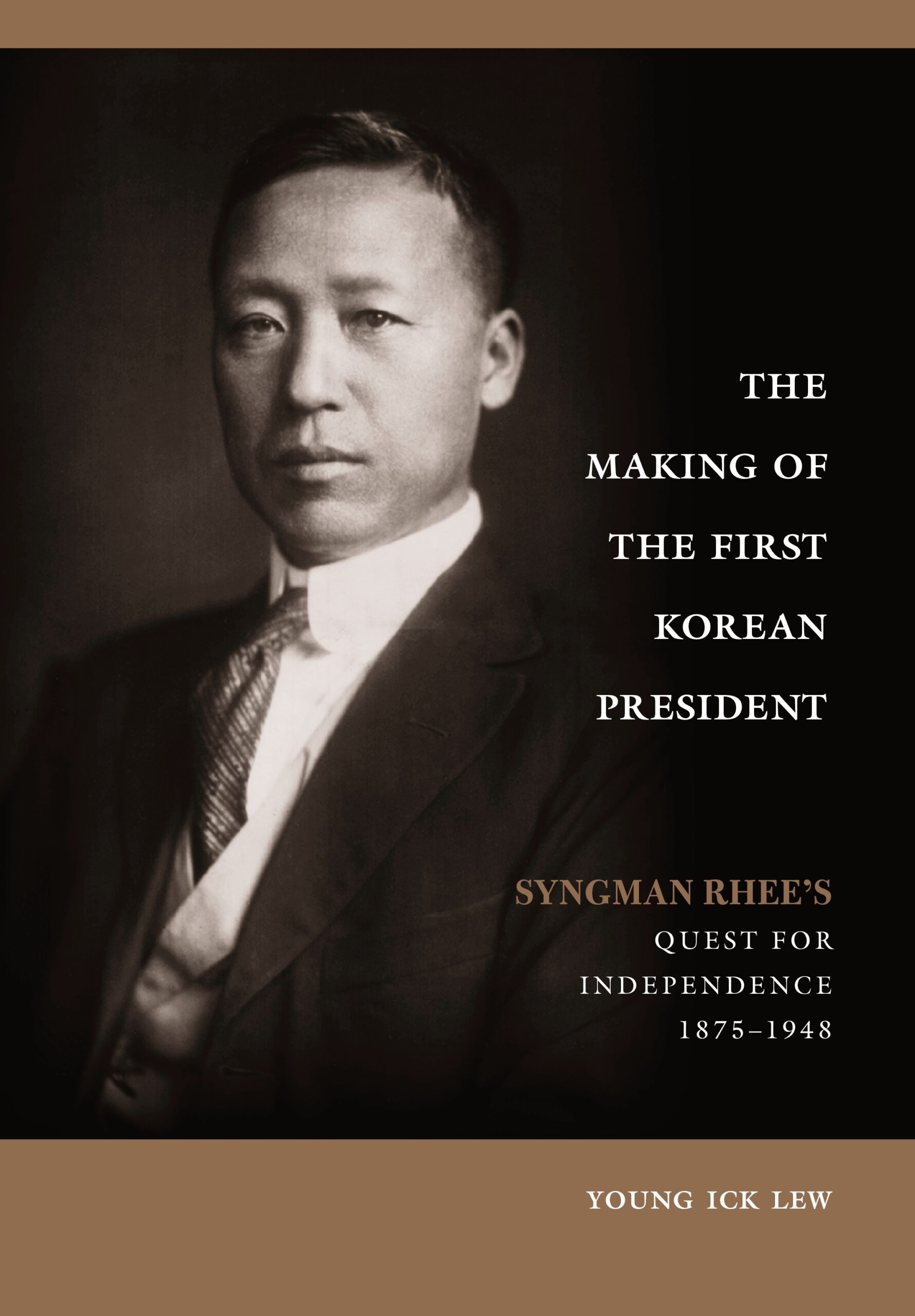The Making of the First Korean President: Syngman Rhee’s Quest for Independence
- About the Book
-
The only full-scale history of Syngman Rhee’s (1875–1965) early career in English was published nearly six decades ago. Now, in The Making of the First Korean President, Young Ick Lew uncovers little-known aspects of Rhee’s leadership roles prior to 1948, when he became the Republic of Korea’s first president. In this richly illustrated volume, Lew delves into Rhee’s background, investigates his abortive diplomatic missions, and explains how and why he was impeached as the head of the Korean Provisional Government in 1925. He analyzes the numerous personal conflicts between Rhee and other prominent Korean leaders, including some close friends and supporters who eventually denounced him as an autocrat.
Rhee is portrayed as a fallible yet charismatic leader who spent his life fighting in the diplomatic and propaganda arena for the independence of his beleaguered nation—a struggle that would have consumed and defeated lesser men. Based on exhaustive research that incorporates archival records as well as secondary sources in Korean, English, and Japanese, The Making of the First Korean President meticulously lays out the key developments of Rhee’s pre-presidential career, including his early schooling in Korea, involvement in the reform movement against the Taehan (“Great Korean”) Empire, and his six-year incarceration in Seoul Prison for a coup attempt on Emperor Kojong. Rhee’s life in the U.S. is also examined in detail: his education at George Washington, Harvard, and Princeton universities; his evangelical work at the Seoul YMCA; his extensive activities in Hawai‘i and attempts to maintain prestige and power among Koreans in the U.S. Lew concludes that, despite the manifold shortcomings in Rhee’s authoritarian leadership, he was undoubtedly best prepared to assume the presidency of South Korea after the onset of the Cold War in the Korean Peninsula.
Essential reading for anyone with an interest in modern Korean history, this work will serve as a lasting portrait of one of the pivotal figures in the evolution of Korea as it journeyed from colonial suppression to freedom and security.
- About the Author(s)
-
Young Ick Lew, Author
Young Ick Lew is a former Chair Professor of Korean Studies at the Graduate School of International Studies, Yonsei University in Seoul, and currently teaches modern Korean history at the National Defense University in Koyang as its first Chair Professor. He graduated from Seoul National University with a BA in Political Science and received a PhD in History and East Asian Languages from Harvard University in 1972. He served as the president of the Korean Historical Association (1991-1992), the founding director of the Institute for Modern Korean Studies at Yonsei University (1997-2001), and the president of the National Institute of Korean History (2013-2015). He is a member of the governing council of the Royal Asiatic Society, Korea Branch. He has written a number of books and articles on late nineteenth- and early twentieth-century Korean history, notably on Dr. Syngman Rhee, the first president of the Republic of Korea. He is the author of Syngman Rhee’s Life and Dreams(Seoul: Chungang Ilbosa, 1996), Youthful Syngman Rhee: A Study on His Activities and Writings in the Seoul Prison, 1899-1904(Seoul: Yonsei University Press, 2002) and The Founding President of the Republic of Korea: New Views on Syngman Rhee’s Career, Thoughts and Accomplishments(Seoul: Ilchokak, 2013). He authored Early Korean Encounters with the United States and Japan(Seoul: Royal Asiatic Society Korea Branch, 2008) and co-authored Korea: Old and New: A History(Seoul: Ilchokak for Korea Institute, Harvard University, 1990) in English. He was the editor-in-chief of The Ihwa House Collection of Syngman Rhee Materials in East Asian Languages. 18 vols. (Seoul: Chungang Ilbosa and Institute for Modern Korean Studies, Yonsei University) and the editor of The Syngman Rhee Correspondence in English, 1904-1948, 8 vols. (Seoul: Institute for Modern Korean Studies, Yonsei University, 2009). He has received many awards, including the Kyung-Ahm Prize in Arts and Sciences (2006), for his academic contributions.
- Reviews and Endorsements
-
- The debate over Syngman Rhee’s legacy is far from over. As this richly detailed biography demonstrates, the historical record should recognize Rhee’s tireless efforts to achieve Korea’s independence before he became president of the Republic of Korea (ROK). . . . Scholars and laymen alike will find The Making of the First Korean President a foundational study of Rhee’s first 73 years. It is the story of a scholar, a Christian, an educator, a diplomat, a patriot, an autocrat—and an imperfect human being.
—Journal of American-East Asian Relations - Relying on newly available sources, such as Rhee’s own correspondence, telegrams, speeches, interview records, essays, poems (many of which are in English or classical Chinese), and interviews with Rhee’s surviving friends and colleagues, the author meticulously traces Rhee’s life from birth to 1948. The book also contains numerous photos of Rhee and the individuals and events discussed.
—Choice: Current Reviews for Academic Libraries - Young Ick Lew’s timely study, The Making of the First Korean President (2014), offers a rich biographical portrait of the first ROK president. . . . Lew offers here a deeply researched vision of Rhee as a flawed, complex individual capable of great achievement and ambition, as well as someone equally skilled at becoming mired in controversy, engaging with factions and intrigue.
—Pacific Affairs
- The debate over Syngman Rhee’s legacy is far from over. As this richly detailed biography demonstrates, the historical record should recognize Rhee’s tireless efforts to achieve Korea’s independence before he became president of the Republic of Korea (ROK). . . . Scholars and laymen alike will find The Making of the First Korean President a foundational study of Rhee’s first 73 years. It is the story of a scholar, a Christian, an educator, a diplomat, a patriot, an autocrat—and an imperfect human being.
- Supporting Resources
-





